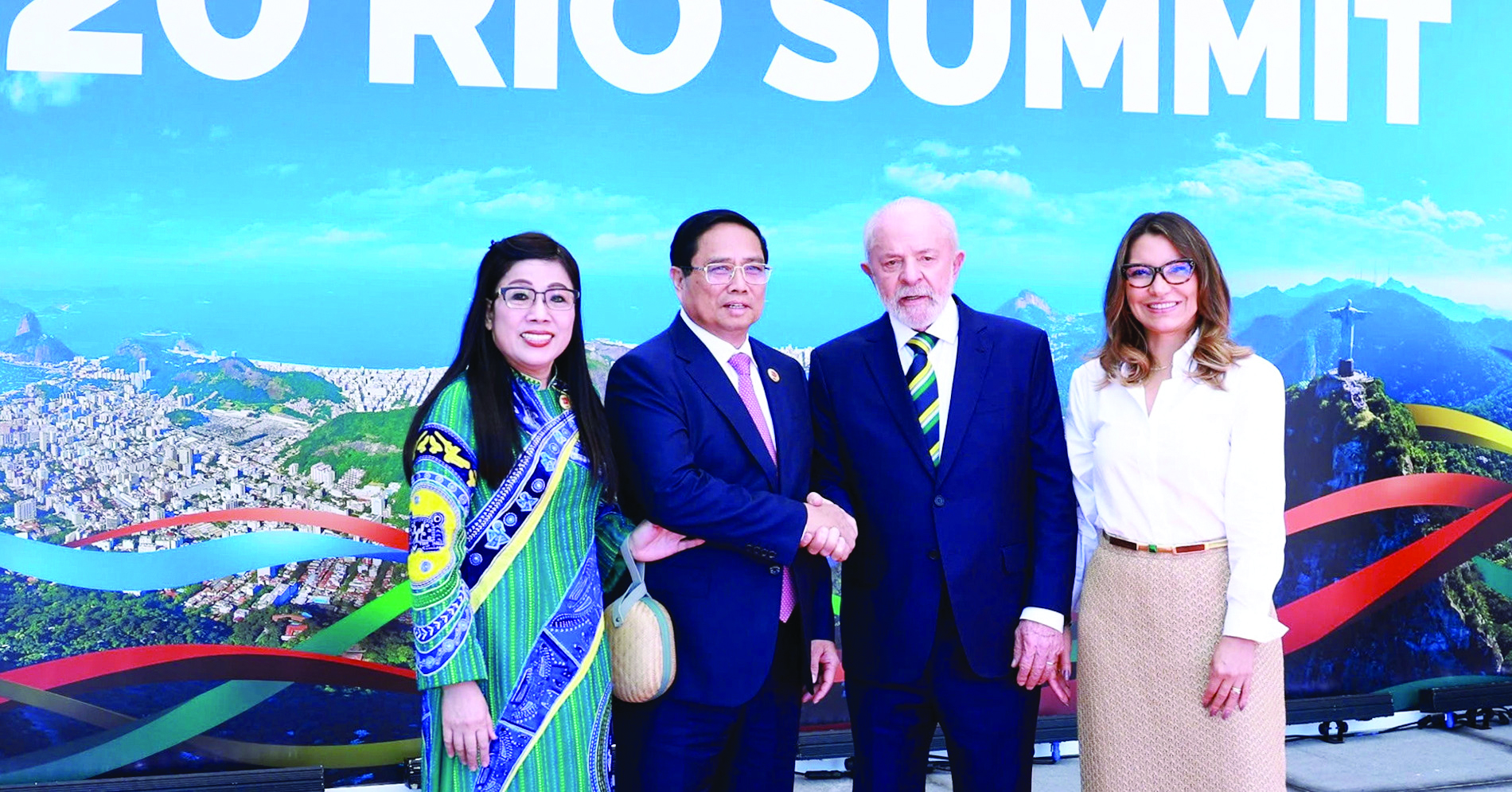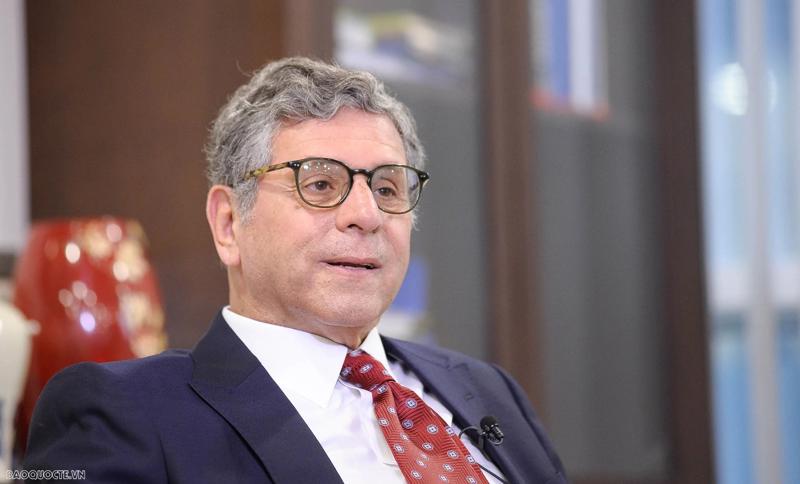During Prime Minister Pham Minh Chinh’s attendance at the G20 Summit in Brazil, Vietnam and Brazil agreed to upgrade their relationship to a Strategic Partnership. What impact will this have on bilateral ties, especially in economic cooperation?
The relationship between Brazil and Vietnam has always been stable, cooperative, and respectful over the past three and a half decades. It gained new momentum following Prime Minister Chinh’s visit to Brazil this year, during which the two countries agreed to elevate relations to a Strategic Partnership.
The upgrading of the partnership is, first and foremost, mutual recognition of the political, economic, strategic, technological, and cultural importance of the two countries in both the domestic and international arenas. The Strategic Partnership also serves as an instrument to bring both countries closer and jointly broaden areas of cooperation in fields such as innovation, digitalization, semiconductors, green agriculture, energy transition, defense, and other areas of mutual interest.
The change in status will contribute to increasing the exchange of high-level visits and people-to-people diplomacy, which are important mechanisms for fostering collaboration and partnerships in new sectors. Accepting an invitation from Vietnam’s leadership, President Luiz Inácio Lula da Silva has confirmed that he will visit Vietnam sometime in 2025, possibly attending the Partnering for Green Growth and the Global Goals 2030 (P4G) Summit, which will be hosted by Vietnam.
I recently held a meeting with the Ministry of Foreign Affairs to discuss an action plan for this new partnership between the two countries, including areas of focus and the steps we will take to implement the plan through specific action. These documents, along with other agreements on investment and related fields, will be signed during the President Luiz Inácio Lula da Silva’s visit next year. Our challenge after that will be to implement these agreements and plans effectively, as we need action.
Brazil is Vietnam’s largest trading partner in South America and second-largest in the Americas, with ten-month trade turnover at $6.58 billion this year. What are the key drivers of trade between the two countries?
Many factors in both countries contribute to the positive dynamics of bilateral trade. Political stability, economic growth, low inflation rates, large internal markets, and a commitment to innovation are fundamental tools for development and building a sustainable economy and society. Brazil is a pioneer in energy transition, with around 90 per cent of its power derived from renewable energy sources. Our ethanol program is a success story, significantly contributing to the decarbonization of most of the country’s large and industrialized cities.
Brazil’s achievements in green agriculture are also undeniable. The country plays a crucial role in global food security, with remarkable results in agricultural production driven by scientific research and the application of advanced technology.
On the other hand, Vietnam, one of the most dynamic and rapidly-growing economies in the world, serves as a strategic hub for high-tech production and is committed to ambitious energy transition projects. Vietnam is self-sufficient in food production and has made significant progress in this area, despite the severe impact of climate change. Brazil shares a strong concern about the effects of climate change on economic growth and social sustainability.
Both countries exhibit a high level of complementarity and have the potential to add substantial value to bilateral trade. With large internal markets, businesses in both countries have a vested interest in expanding their collaboration.
However, there are two notable challenges that could hinder trade growth: the significant geographical distance between the two countries and the language barrier. Fortunately, these challenges can be overcome with concerted effort.
Promoting free trade agreement (FTA) negotiations between Vietnam and the Southern Common Market, known as MERCOSUR, was a key focus of Prime Minister Chinh’s visit to Brazil. What impact will this agreement have on Vietnam - Brazil trade and Vietnam’s ties with South America?
MERCOSUR is an extraordinary integrated market, with over 300 million consumers, located in one of the most peaceful regions in the world. Since 2019, MERCOSUR member countries have agreed on terms to create a free trade zone, which has significantly increased the production and trade of high-value-added products among its members, boosting trade flows in the region nearly ten-fold.
ASEAN, in turn, is an even larger market, with over 700 million potential consumers. It is natural, therefore, to explore alternatives to bring these two promising markets closer. From Brazil’s perspective, MERCOSUR serves as the primary political, economic, and diplomatic mechanism in the region.
MERCOSUR provides a framework to foster trade growth, making Prime Minister Chinh’s interest in negotiating an FTA between Vietnam and MERCOSUR a logical and promising initiative.
Meanwhile, President Luiz Inácio Lula da Silva has expressed interest in discussing this matter with MERCOSUR partners as a crucial step toward strengthening ties between MERCOSUR and ASEAN.
However, the negotiation process will take time. Even if the Brazilian Government supports an FTA, consultations with the private sector are necessary to gauge their interest. This will then be followed by consultations with other MERCOSUR members.
Brazil’s investment in Vietnam currently stands at $3.85 million, while Vietnam’s investment in Brazil is $700,000. How can the two sides improve to match their economic potential?
Beyond trade, business motivation to invest depends not only on market and political stability - which are present in both the Vietnamese and Brazilian markets - but also on a broad promotion of investment opportunities in both countries. Vietnam and Brazil have already seen positive results in trade dynamics, making business investments the next natural step.
A recent study by the Brazilian Trade and Investment Promotion Agency (APEX Brazil) shows that the internationalization of Brazilian enterprises is growing. According to the study, 45.1 per cent of Brazilian enterprises increased their foreign investment portfolios, 38 per cent maintained their investment levels, and only 16.8 per cent reduced investments. The most promising areas for investment, based on a survey of 237 enterprises, were machinery, equipment, and chemical products.

Several factors have contributed to the increase in Brazilian investments abroad, including the growth of e-commerce, consolidation of partnerships, innovation in products, and investments in technical qualifications. This scenario opens up possibilities for both countries to boost interest in investment activities.
Vietnam is focusing on a high value added economy and has proposed collaboration with Brazil in areas like civil aviation and semiconductors. What is the potential for expanding economic and investment cooperation between the two countries in these fields?
There are two key factors of convergence between Brazil and Vietnam: both countries are committed to growth and sustainable development, no matter the challenges. There is a shared understanding that development targets cannot be achieved without innovation and transformation. In this regard, and considering the countries’ potential resources, the Brazilian Government is implementing strategies to develop new areas, especially AI, digital transformation, semiconductors, and energy transition.
These fields present promising areas for expanding bilateral economic and investment cooperation. Last year, the Brazilian Minister of Science and Technology visited Vietnam, where, among other important topics, she discussed the real possibility of launching a joint partnership in semiconductors, including training and expertise in human resources.
Last year and again recently, Prime Minister Chinh visited the Embraer headquarters in São Paulo, which is the third-largest commercial aircraft manufacturer in the world, exploring new possibilities for cooperation in outer space, defense, and transportation. The company has said that if it can sell aircraft to Vietnam, whether military or civilian, it will consider opening a maintenance center for Southeast Asia in the country. Additionally, Brazil can provide loans for Vietnam to purchase these aircraft through the Brazilian Development Bank or the Central Bank. Everything is on the table.
Embraer will actively participate in the Vietnam International Defense Expo 2024, from December 19-22. The expo will again present a great opportunity to share visions and deepen the dialogue between Brazil and Vietnam.
With a combined population of over 300 million, tourism holds untapped potential in Brazil - Vietnam relations. What steps can both countries take to promote tourism and cultural exchange? How can Vietnam attract more Brazilian visitors, and vice-versa?
Both Brazil and Vietnam have friendly, welcoming people and share a positive view of each other. These aspects are an important starting point for promoting tourism between the two countries.
Brazilian music, football, and natural beauty are well-known in Vietnam. In Brazil, Vietnam is recognized for its rich history, rapid economic growth, and innovative capabilities. Foreign tourists feel safe and welcomed in Vietnam, and the country has well-developed tourist infrastructure, including resorts, hotels, and airports.
While these elements are important, they are not enough to spark a robust tourism exchange. Challenges such as the language barrier, the long geographical distance, and limited connectivity remain.
To overcome these barriers, it is essential to create conditions that encourage tourism. One idea is to increase the exchange of information between government agencies responsible for tourism promotion. Organizing cultural events, sports competitions, fashion shows, and music festivals, and participating in trade events are all strategies that could support institutional efforts to enhance bilateral cooperation in tourism.
How do you view the prospects for economic cooperation between Vietnam and Brazil in the years to come?
The strengthening of friendship and cooperation between Brazil and Vietnam has been a natural progression over 35 years of fruitful bilateral relations. Both countries cooperate in the multilateral field and share a common vision for international peace and stability. They also have similar aspirations for a prosperous and sustainable future.









 Google translate
Google translate